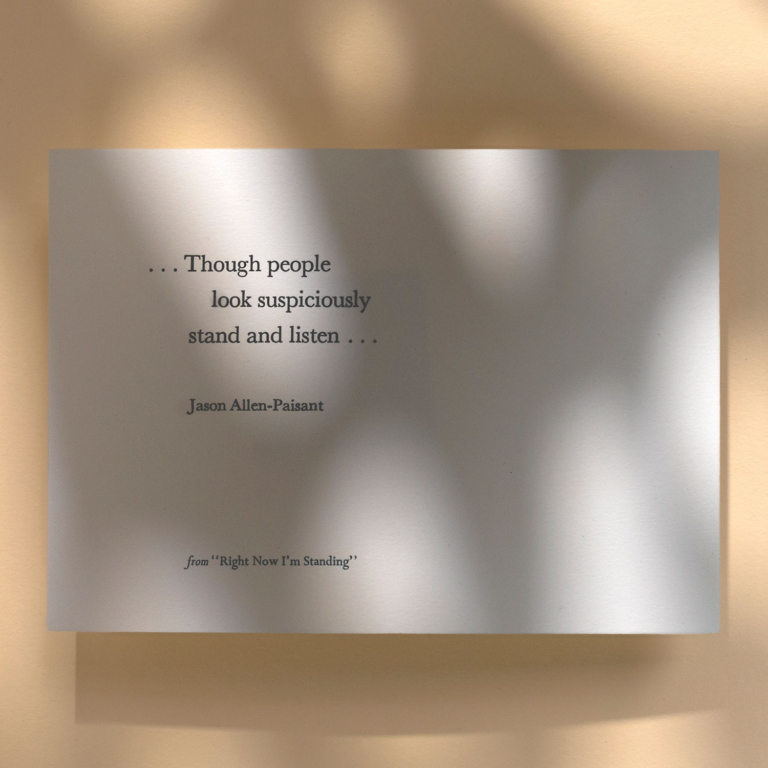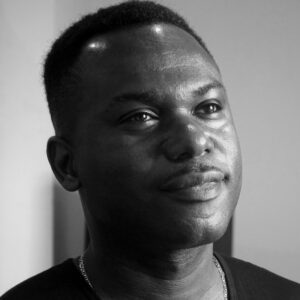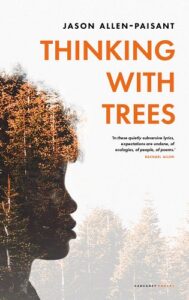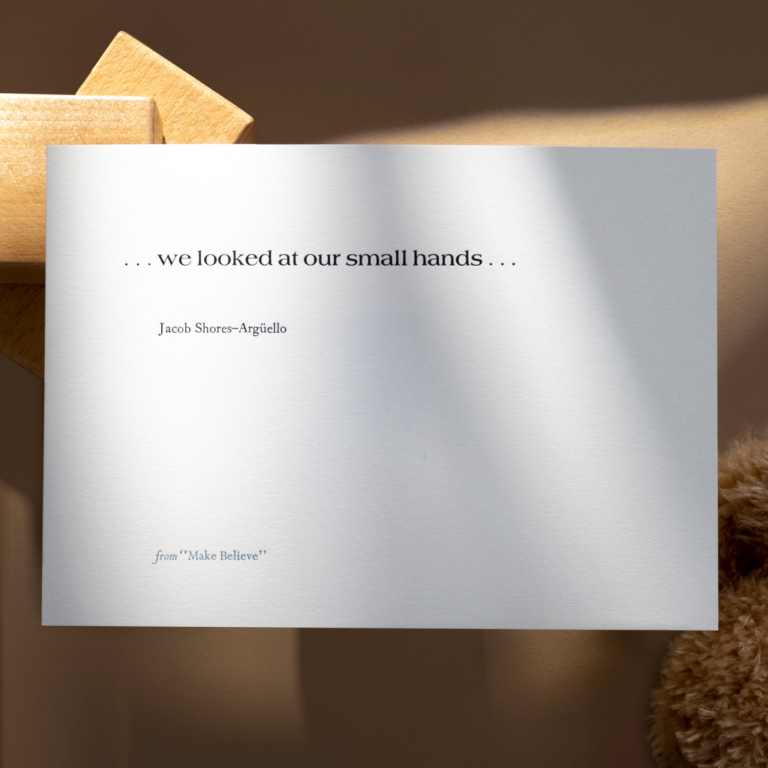Jason Allen-Paisant
Right now I’m Standing
In a poem considering trees, Jason Allen-Paisant opens up many associations with trees: in a woodland, there’s a dead tree, from which new forms of life are finding sustenance. He, a Black man in the woods, is aware of people looking suspiciously at him. The poem reflects on how trees were used for building the ships of enslavers, who considered countries and people their property. In light of this, he shares a nature poem about all the things that nature holds.

Letterpress prints by Myrna Keliher | Photography by Lucero Torres
Guest

Jason Allen-Paisant is a Jamaican poet whose first poetry collection, Thinking with Trees, was published by Carcanet Press in 2021. His work has also appeared in PN Review, the Poetry Review and Callaloo. He teaches in the School of English at the University of Leeds.
Transcript
Pádraig Ó Tuama: My name is Pádraig Ó Tuama. I write poems, and a few years ago I sent some poems to a friend of mine in England and asked him if he could give a read of them and give some feedback. He wrote back, saying, Look, you’ve got a good eye for speech and for the emotional landscape about what’s going on, but what can you see? Where are these poems being situated? He said to me that where they were being situated would be filled with information and with delight, and also with pain and the history about what it’s been like to be in that place — that places and our relationship to them carry an enormous amount of information to be paid attention to.
[music: “Praise the Rain” by Gautam Srikishan]
“Right Now I’m Standing,” by Jason Allen-Paisant:
“Right now I’m standing
beneath what used to be
I imagine an impressive tree
Split down its bole it
has sprouted green leaves that will be rustling
way into September
At its base lying athwart the clearing
is the severed part
The colour of brown has weathered to near-grey
and the footfall of walkers has covered
the wood with a layer of dust & yet
the part that has fallen among the spikenard
and hungry shrubs surges out of death
The raspberries feed on its breath
and beetles thrive in the slurry middle
where the bole rots
Listen there is nothing as exhilarating
as the feeling of life coming into you
Though people
look suspiciously
stand and listen do not go anywhere
we have been the workers
just the workers
In the Congo one man had a land
almost eighty times
the size of Belgium as his estate
We have been property
When I talk about reclaiming time
I’m just thinking about my body
standing in the middle of this woodland
and
doing nothing nothing”
[music: “Dirty Wallpaper” by Blue Dot Sessions]
Jason Allen-Paisant grew up in a place called Coffee Grove, in central Jamaica. And his grandmother who had raised him was a farmer. So trees were everywhere. In some essays, he writes about cedars and logwood and guano trees. And now he’s moved to live in England, in Leeds, and is living in an affluent part of that city, and a part where there’s a lot of green space. There’s a curated park. So he’s surrounded by green. And he’s surrounded by places where people take leisurely walks. And he talks about a certain kind of relearning what it means to be in nature.
But he’s relearning this within the context of being an adult Black man in a place in England where he is going to be observed as a Black man taking walks in nature. So on the one hand, he’s unlearning the years when he hasn’t done this, when he’s been in other places where he would be observed under a predatory white gaze, a suspicious white gaze, but he’s also returning to something that he knew. He speaks about bringing his one-year-old child with him when he goes for walks and feeling a strange recognition between his child walking and him walking, because, he says, children, when they’re learning to walk, are hyper-aware of all the threats that are around them, the things that might trip them up — and him, too, except they’re different threats for him.
[music: “Orchard Lime” by Blue Dot Sessions]
The opening poem in this collection from Jason Allen-Paisant is a poem called “Walking with the Word ‘Tree.’” And in that poem and in so many of the poems in the book, including this one, “Right Now I’m Standing,” he’s exploring what wandering or ambling or a pleasurable aimlessness while taking a walk would be, looking at leisure. And he writes about how that possibility is foreclosed by the fact of being Black. He references Lucille Clifton in this poem, in the line toward the end, “We have been property.” And she had said that when she tried to write nature poems that there was always another poem underneath it, because race was always present; because looking at ways within which this poem refers to plants, the word “plantation” is present as an echo there.
There’s the reality that there has been the understanding that it is white people who own land and who direct the workers or who own the workers, in the most terrible, abominable understanding of humanity. And so within the context of that, he is still needing to search, here and now. “[W]e have been the workers / just the workers.” And so he’s telling people, “stand and listen.” And then he’s asserting again, We have been the property. And so the idea of being out in nature is one that has never been one that is a space of equality. It has always been one that has had an understanding of who owns the land on which we are and who, therefore, directs the workers to do things while they enjoy their own taken leisure.
So he’s examining certain kinds of borders, in terms of borders of participation, and participation might be denied because of race or economics or gender. And that leisure, therefore, is not something that everybody can freely participate in. And what this poem is doing is troubling that and analyzing that and asserting the right and the joy to take leisure, and the need, too, to pay attention to the reason why such assertions are necessary.
[music: “Slate Tracker” by Blue Dot Sessions]
So there’s a whole variety of locations implicated in this poem. First of all, the “Right Now I’m Standing” speaks about Leeds, this place in England where he’s based now. And in other poems in this book, he writes about how the Leeds huge textile industry, for the last couple of hundred years, had required indigo and other materials that were made in plantations in the Caribbean. And so there’s this connection between Jamaica and other Caribbean countries and Leeds, and England, through that terrible trade that was established there.
And then there’s the reference, toward the end of the poem, “In the Congo, one man had a land / almost 80 times / the size of Belgium as his estate.” It’s a reference to King Leopold of Belgium. What’s so interesting, I think, is that Jason Allen-Paisant doesn’t say “a king.” He speaks about him as a man. He asserts an equality that King Leopold would not have allowed or considered, I don’t think.
And then I think in this poem that there’s a reference, certainly, to the particular case in Central Park where Christian Cooper had the police called on him by a dog walker, when he was challenging the dog walker to keep their dog on a leash. Later on in this book, there’s a full poem that’s directly about that incident. So already what we can hear is there’s references to places like Leeds, and the Congo, and Belgium, and the broader United Kingdom, and the United States, and Jamaica, and the Atlantic Ocean in-between.
The boats that crossed the Atlantic Ocean were made from wood, too — again, another reminder that what some people might think of as taking a wander in nature, looking at wood, is a way within which other people would say, Where were the forests where the wood grown for the boat that annihilated my culture, annihilated my people, captured my people — where are those forests? And so I think present in this poem is a way within which there’s a critique of the idea that natural space, that nature space, that green space has always been just about leisure.
[music: “Every Place We’ve Been” by Gautam Srikishan]
Throughout this poem, I think there’s a theme of freedom and space and standing and leisure. He said, in one of the essays of his that I read, that racism pushes its victims into positions of always having to react. And what he’s saying here is actually there’s freedom in claiming time, in poetry and in leisure, and that he is doing in poetry what is necessary also to do in body — claiming the right to connection with his own choice, and his own choice to do what he wishes in green space. And so standing still is a way of asserting that he’s not the property nor the worker of whoever might be looking suspiciously at him. And standing still, in those last three words of the poem, doing “nothing, nothing” is a powerful assertion, a beautiful assertion, a rich one, one behind which there are centuries of violation.
He even does that in the space of the poem. The poem, when you look at it, has unexpected spaces between some of the words. For instance, “I imagine an impressive tree,” there’s three or four spaces between the word “imagine” and “impressive.” And then “Listen, there is nothing as exhilarating / as the feeling of life coming into you,” there’s a space between “listen” and “there.” And I think he’s allowing the poem, too, to take whatever space the poem wishes to take. The form of the poem is saying, I can stretch out. I can be languorous. I can be present here and open up the space and take up whatever space I want, without asking permission, without having to defend myself.
[music: “The House You Wake In” by Gautam Srikishan]
This poem has a profound attention to the nature of watching nature. And at its heart, there’s an invitation to everybody to do nothing in nature, and to watch and to notice; to just be there; to be present, in order to see the kind of things that he’s seeing at the start of the poem. He’s standing beneath what used to be an impressive tree. And the trunk, or bole, is split. But he’s looking at the part of the tree that’s fallen among the plants — spikenard — and he is seeing that other things are growing. And he is looking at the question of how organic life continues to feed into other organic life. There’s life springing from death, springing from life. There’s abundance. There’s an extraordinary sense of flourishing and growth, and the cycle of life and death leading to more life and death, in his poem.
But then there’s also an invitation, for some, to watch their racism, prejudice, and the ways within which they — and by “they,” I mean me — might be likely to police who we think should be there in nature, too, watching, and to pay attention to that. For others, it’s an invitation to dismantle ideas of ownership and participate in a kind of doing nothing in public, rather than going into nature with the idea of conquest, the idea of taking, the idea of how something can be used for something else, used for some kind of profit.
Deeper than that, there’s an invitation to a leisure of the body. And that is a joy and an entitlement for all.
[music: “The House You Wake In” by Gautam Srikishan]
“Right Now I’m Standing,” by Jason Allen-Paisant:
“Right now I’m standing
beneath what used to be
I imagine an impressive tree
Split down its bole it
has sprouted green leaves that will be rustling
way into September
At its base lying athwart the clearing
is the severed part
The colour of brown has weathered to near-grey
and the footfall of walkers has covered
the wood with a layer of dust & yet
the part that has fallen among the spikenard
and hungry shrubs surges out of death
The raspberries feed on its breath
and beetles thrive in the slurry middle
where the bole rots
Listen there is nothing as exhilarating
as the feeling of life coming into you
Though people
look suspiciously
stand and listen do not go anywhere
we have been the workers
just the workers
In the Congo one man had a land
almost eighty times
the size of Belgium as his estate
We have been property
When I talk about reclaiming time
I’m just thinking about my body
standing in the middle of this woodland
and
doing nothing nothing”
[music: “Praise the Rain” by Gautam Srikishan]
Chris Heagle: “Right Now I’m Standing” comes from Jason Allen-Paisant’s book Thinking with Trees. Thank you to Carcanet, who gave us permission to use Jason’s poem. Read it on our website, at onbeing.org.
[music: “Praise the Rain” by Gautam Srikishan]
Poetry Unbound is: Gautam Srikishan, Erin Colasacco, Eddie Gonzalez, Lilian Vo, and me, Chris Heagle.
Our music is composed and provided by Gautam Srikishan and Blue Dot Sessions. This podcast is produced by On Being Studios, which is located on Dakota land.
We also produce other podcasts you might enjoy, like On Being with Krista Tippett, Becoming Wise, and This Movie Changed Me. Find those wherever you like to listen, or visit us at onbeing.org to find out more.
Books & Music
Recommended Reading
The On Being Project is an affiliate partner of Bookshop.org and Amazon.com. Any earnings we receive through these affiliate partnerships go into directly supporting The On Being Project.









Reflections